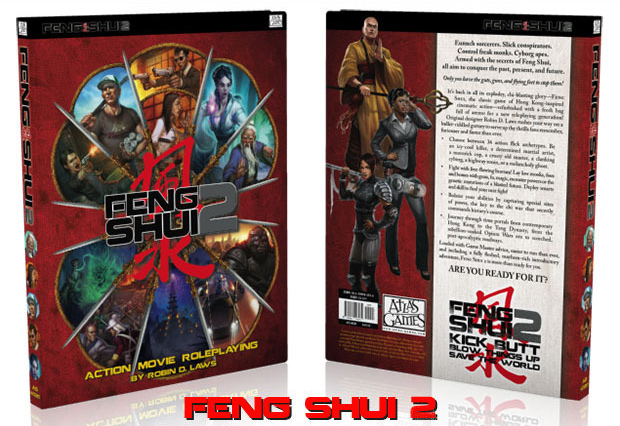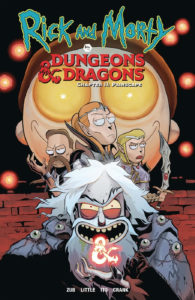I’ve gone on at length about my love of tabletop role-playing games and how I feel they’re the best entertainment money can buy. Sitting down to create a new interactive tale with a group of friends is a joyous experience that few other things can match. Playing RPGs strengthened my storytelling skills and lead me down the creative path to becoming a comic writer.
I want to talk about one game in particular that stands out among the dozens and dozens I’ve played over the years: FENG SHUI.
Feng Shui is an Action Movie Role-Playing Game written by Robin Laws. It takes the heightened intensity of Hong Kong-style action films and, in a simple and cohesive way, creates a storytelling framework that encourages everyone playing to have a great time. It changed the way I played games and, for many designers and players alike, it was a milestone in the way that it injected storytelling ideas into the mechanical components of gaming.
Here’s the thing: In practically every tabletop RPG that came before Feng Shui, there was a distinct divide between narration and action. You could “role play” all you wanted as the story progressed but, once the action kicked into gear, it was time to break out the dice and hope for the best. No matter what you envisioned in your mind as weapons clashed, the rules alone would dictate who hits, how much damage they take, and the end result therein. The narrative component was completely pushed out in favor of cold numbers and probabilities.
What Robin did with Feng Shui was to weave the narrative back into the heart of the action and make it integral to how the game is played. Describing what you’re doing during combat, how you’re doing it, and making it as entertaining as possible grants you bonuses to achieve the very thing you’re describing. Instead of the rules working against your wildest imagination, it propels it forward and makes action scenes a bombastic rollicking part of the story instead of a number crunching speed bump. It’s no longer about min-maxing the stats and hoping the dice play your way, it’s about entertaining the whole table as the Game Master rewards your inventiveness and creativity.
That critical shift in focus made a massive difference in how our group played RPGs. It pushed Feng Shui to the top of the pile whenever we wanted to pull together a game or teach new players what RPGs were all about. It made the mechanical part of the game fun and encouraged everyone at the table to contribute in a way I’d never experienced before.
Feng Shui effortlessly codifies the ridiculous entertainment of action movies and empowers everyone playing to throw down in an over-the-top thrill ride with an infinite production budget. It rewards involvement, energizes storytelling, and never fails to surprise.
Our college gaming group ran a Mission Impossible-style episodic campaign called Agents of Intrigue. It started off as a simple throw-together format to run games when we weren’t sure who would be available from week to week and, over dozens of wild sessions and years of play, it evolved into a sprawling cast of colorful characters and weaving plot lines punctuated with wry humor and bone-crunching action. To this day that campaign is one of my favorite gaming memories.
The Feng Shui 2nd Edition Kickstarter is currently running down its last day of fundraising and I heartily encourage everyone I know who loves games to contribute. Beyond the PDF or physical book of rules, you’re helping support one of the best RPG games of all time while receiving a toolkit for creating new heart-pounding stories of ultimate ass-kickery.
DO IT and tell ‘em I sent ya. 🙂






 Zub on Amazon
Zub on Amazon Zub on Instagram
Zub on Instagram Zub on Twitter
Zub on Twitter
0 Comments.